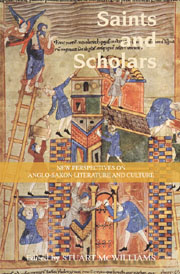 Saints and Scholars
Saints and Scholars Book contents
- Frontmatter
- Contents
- List of Contributors
- Abbreviations
- Introduction
- I Hagiography and the Homiletic Tradition
- II Aspects of Community and Consumption
- III Reflections on Old English Scholarship
- 15 Old English for Non-Specialists in the Nineteenth Century: A Road Not Taken
- 16 The Beginnings of English Poetry: Philological and Textual Challenges for the Creative Imagination
- Poems
- Hugh Magennis: A Bibliography, 1981–2011
- Index
- Tabula Gratulatoria
16 - The Beginnings of English Poetry: Philological and Textual Challenges for the Creative Imagination
from III - Reflections on Old English Scholarship
Published online by Cambridge University Press: 05 February 2013
- Frontmatter
- Contents
- List of Contributors
- Abbreviations
- Introduction
- I Hagiography and the Homiletic Tradition
- II Aspects of Community and Consumption
- III Reflections on Old English Scholarship
- 15 Old English for Non-Specialists in the Nineteenth Century: A Road Not Taken
- 16 The Beginnings of English Poetry: Philological and Textual Challenges for the Creative Imagination
- Poems
- Hugh Magennis: A Bibliography, 1981–2011
- Index
- Tabula Gratulatoria
Summary
Ond eac swelce monige oðre æfter him in Ongelþeode ongunnon æfæste leoð wyrcan; ac nænig hwæðre him þæt gelice don meahte, for þon he nales from monnum ne þurh mon gelæred wæs, þæt he þone leoðcræft leornade, ac he wæs godcundlice gefultumed ond þurh Godes gife þone songcræft onfeng.
And also, similarly, after him, many others among the English began to compose pious poems; but, however, none of them was able to do it like him, because he was not taught the poetic skill that he learned from men or by anyone at all, but he was divinely aided and received his skill at recitation through a gift of God.
hwilum cyniges þegn,
guma gilp-hlæden, gidda gemyndig,
sē ðe eal-fela eald-gesegena
worn gemunde, word ōþer fand
sōþe gebunden. Secg eft ongan
sīð Bēowulfes snyttrum styrian
ond on spēd wrecan spel gerāde,
wordum wrixlan.
Meanwhile, a thane of the king's household, a carrier of tales, a traditional singer deeply schooled in the lore of the past, linked a new theme to a strict metre. The man started to recite with skill, rehearsing Beowulf's triumphs and feats in wellfashioned lines, entwining his words.
The stories that are now important for maintaining our sense of literary heritage and vernacular identity are usually interesting because their relationship to myth and history is rarely straightforward. Such complexity always presents a challenge, but particularly so when we realise that ‘the past is a foreign country: they do things differently there’.
- Type
- Chapter
- Information
- Saints and ScholarsNew Perspectives on Anglo-Saxon Literature and Culture in Honour of Hugh Magennis, pp. 252 - 260Publisher: Boydell & BrewerPrint publication year: 2012


